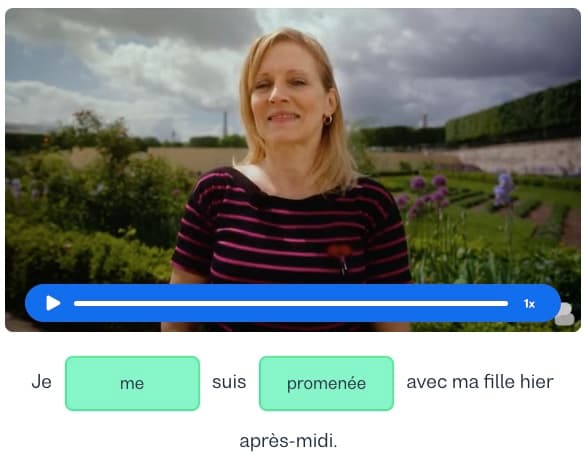I want to learn...
We use French reflexive verbs in order to talk about a subject who is performing an action towards themselves. You’ll find this useful if you want to talk about putting on some clothes, washing yourself, or if you’ve been injured, as we use these verbs to talk about the body. We’ll look at how reflexive verbs work in a sentence, and some helpful ways to remember their conjugations.
Rules on French reflexive verbs
Reflexive verbs are a type of pronominal verb. This means that they come with a reflexive pronoun in the sentence.
Reflexive verbs are formed out of “se” (which means oneself, yourself, himself, and so on) plus the infinitive form of the verb. If a verb starts with a vowel, then “se” becomes shortened to “s”.
There are also some other rules to be aware of before we start looking at some examples of reflexive verbs in French.
As you might have noticed, reflexive verbs are conjugated in a sentence so that they agree with the reflexive pronoun that refers to the subject pronoun.
For example in:Je m’appelle Rebecca.(My name is Rebecca.) - The reflexive verbs' appeler becomes m’appelle, as it needs to agree with the reflexive pronoun that in turn agrees with the subject pronoun in the sentence. In this example, the subject pronoun is je.
Below is a list of 10 common reflexive verbs that you’ll come across in French, as well as an example sentence for each.
Reflexive verb examples
| French reflexive verb | English translation | Example sentence in French |
|---|---|---|
| s’habiller | To get dressed | je m'habille (I get dressed) |
| se lever | To get up | je me lève le matin (I get up in the morning) |
| se coucher | To go to bed | je vais me coucher (I go to bed) |
| se promener | To take a walk | je vais me promener (I go for a walk) |
| se réveiller | To wake up | Il se réveille (He wakes up) |
| se taire | To be silent/quiet | je vais me taire (I will be quiet) |
| se doucher | To take a shower | Ils se douchent (They are showering themselves) |
| se baigner | To bathe/To swim | elle va se baigner à la plage (she is going to swim at the beach) |
| se brosser | To brush | Nous nous brossons les dents (We brush our teeth) |
| se fatiguer | To get tired | je me suis fatigué (I tired myself out) |
Reflexive verbs and tense
While most of the examples we’ve looked at above talk about doing something in the present tense, it’s possible to use reflexive verbs in many different French tenses. Most of the examples we’ve used above are in the present tense, which means that they refer to something happening now. We’ll look at how you use reflexive verbs in the simple past, before moving onto how they are used in the near future to describe something that you are going to do soon.
Reflexive verbs in simple past tense
Firstly, let’s tackle the simple past tense – the most commonly used past tense in French. If you want to use a reflexive verb in this context, you’ll need to use a conjugation of the verb être (“to be”) before the main verb’s past participle, such as in:
Je me suis lavé. (I washed myself.)
As you can see from the above example, the past participle lavé is preceded by the conjugation of the verb être. In this case, the conjugation is suis as it needs to be in agreement with the personal pronoun je. Got it? Let’s turn now to using reflexive verbs in the French simple future tense.
Talking about the near future with reflexive verbs
As you may have also noticed in some of the above examples in our table, many sentences with reflexive verbs in them start with je vais– what you might recognise as a conjugation of the verb aller, or “to go”). The conjugation of aller comes into play when you are talking about something that you’re going to do to yourself in the near future.
Reflexive pronominal vs non-pronominal verbs
Unlike reflexive pronominal verbs, non-pronominal verbs don’t have a pronoun which agrees with the subject in the sentence. However, it’s worth bearing in mind that some verbs can be both reflexive pronominal and non-pronominal depending on whether you use them reflexively or not. A verb like laver or “to wash” can be both reflexive and non-reflexive. It’s reflexive if you’re using it to refer back to the subject, such as in:
Je me lave. (I wash myself.)
However, the verb laver can also be used non-reflexively (as it can in English too), such as in:
Je lave le chien (I wash the dog.)
In this non-reflexive example, you don’t need a pronoun which agrees with the subject – the verb doesn’t refer back to the subject, it refers to le chien, or “the dog” instead.
Negative reflexive verbs
Finally, what happens if you want to make a reflexive verb negative? Let’s explore this next. In order to make a reflexive verb negative, simply place ne and pas in each side of the reflexive verb and the reflexive pronoun, such as in:
Je ne m’appelle pas Rebecca. (My name is not Rebecca.)
You’ll now be able to use negative reflexive verbs in simple tenses!
We hope you’ve now got a better understanding of how reflexive verbs work in French, as well as how you can use them across some common tenses. Come back to this article if you need to recap any of the points above – remember, it’ll take time and practice to become familiar with the grammatical rules of reflexive verbs!
Newlanguages


